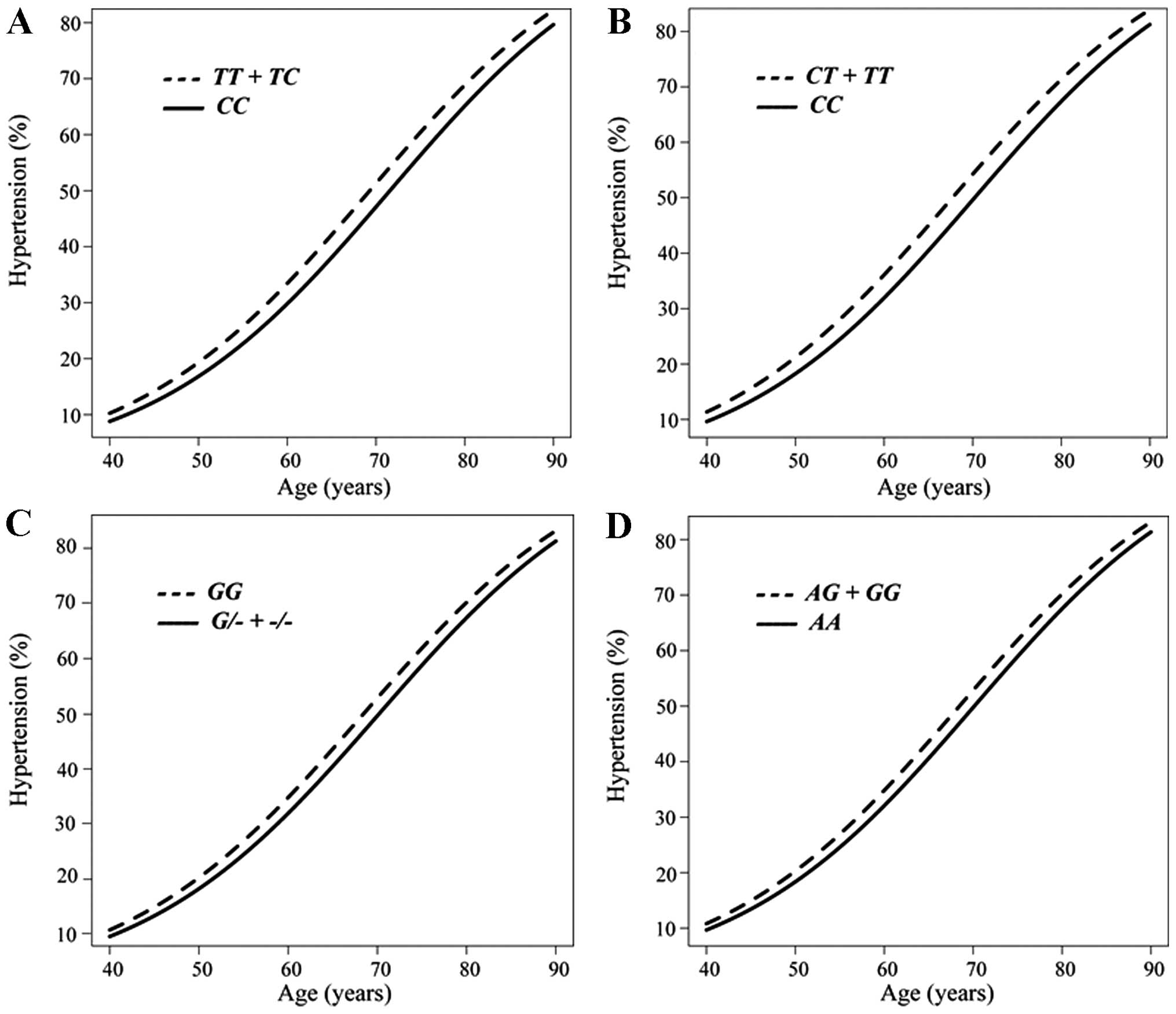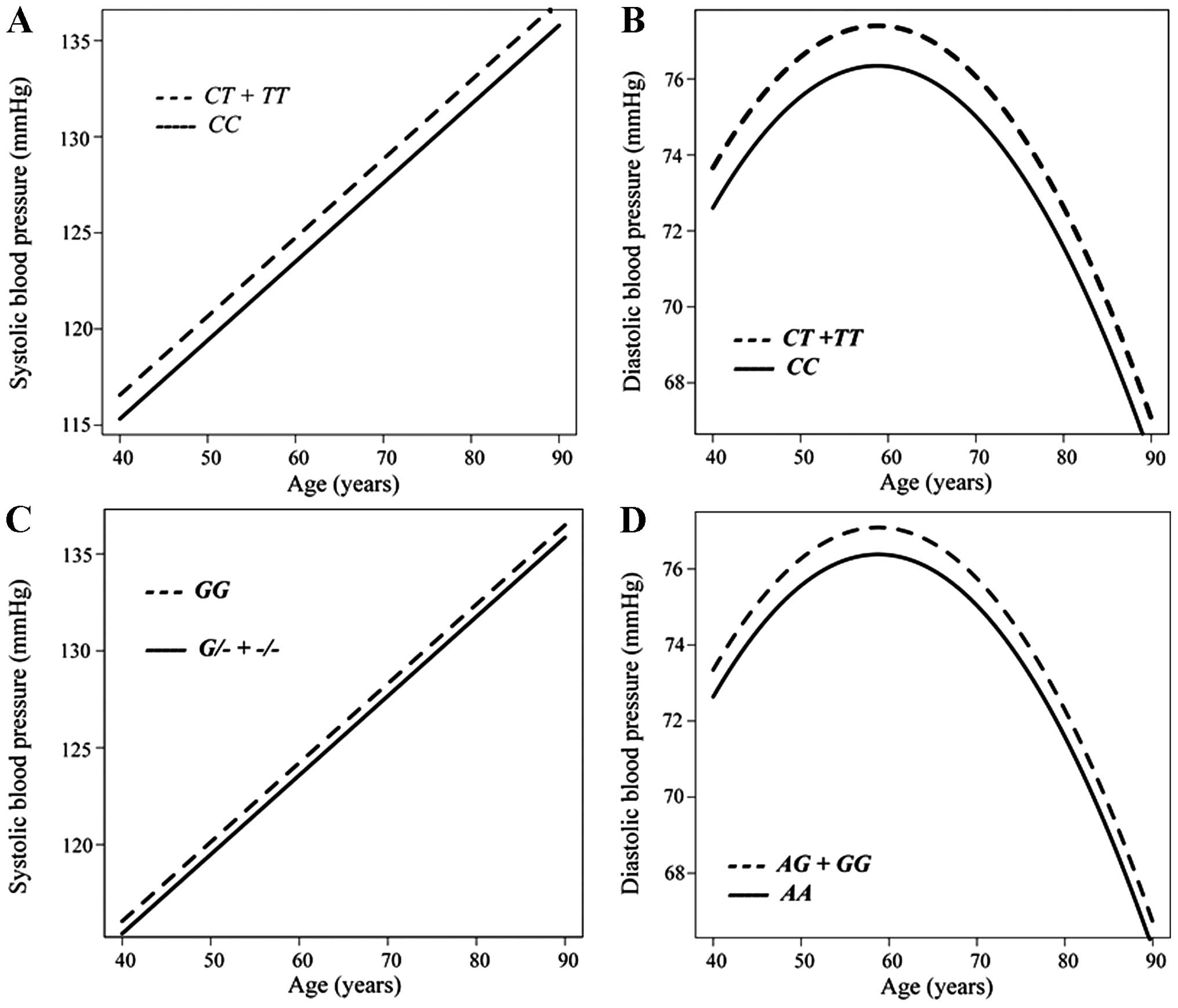|
1
|
Lifton RP, Gharavi AG and Geller DS:
Molecular mechanisms of human hypertension. Cell. 104:545–556.
2001. View Article : Google Scholar : PubMed/NCBI
|
|
2
|
Kupper N, Willemsen G, Riese H, Posthuma
D, Boomsma DI and de Geus EJ: Heritability of daytime ambulatory
blood pressure in an extended twin design. Hypertension. 45:80–85.
2005. View Article : Google Scholar
|
|
3
|
Agarwal A, Williams GH and Fisher ND:
Genetics of human hypertension. Trends Endocrinol Metab.
16:127–133. 2005. View Article : Google Scholar : PubMed/NCBI
|
|
4
|
Kannel WB: Elevated systolic blood
pressure as a cardiovascular risk factor. Am J Cardiol. 85:251–255.
2000. View Article : Google Scholar : PubMed/NCBI
|
|
5
|
Sacco RL, Benjamin EJ, Broderick JP, Dyken
M, Easton JD, Feinberg WM, Goldstein LB, Gorelick PB, Howard G,
Kittner SJ, et al: American Heart Association Prevention
Conference. IV. Prevention and Rehabilitation of Stroke. Risk
factors Stroke. 28:1507–1517. 1997. View Article : Google Scholar
|
|
6
|
Yamagata K, Ishida K, Sairenchi T,
Takahashi H, Ohba S, Shiigai T, Narita M and Koyama A: Risk factors
for chronic kidney disease in a community-based population: A
10-year follow-up study. Kidney Int. 71:159–166. 2007. View Article : Google Scholar
|
|
7
|
Ehret GB, Munroe PB, Rice KM, Bochud M,
Johnson AD, Chasman DI, Smith AV, Tobin MD, Verwoert GC, Hwang SJ,
et al: CHARGE-HF consortium: Genetic variants in novel pathways
influence blood pressure and cardiovascular disease risk. Nature.
478:103–109. 2011. View Article : Google Scholar : PubMed/NCBI
|
|
8
|
Wain LV, Verwoert GC, O’Reilly PF, Shi G,
Johnson T, Johnson AD, Bochud M, Rice KM, Henneman P, Smith AV, et
al: Genome-wide association study identifies six new loci
influencing pulse pressure and mean arterial pressure. Nat Genet.
43:1005–1011. 2011. View
Article : Google Scholar : PubMed/NCBI
|
|
9
|
Newton-Cheh C, Johnson T, Gateva V, Tobin
MD, Bochud M, Coin L, Najjar SS, Zhao JH, Heath SC, Eyheramendy S,
et al: Genome-wide association study identifies eight loci
associated with blood pressure. Nat Genet. 41:666–676. 2009.
View Article : Google Scholar : PubMed/NCBI
|
|
10
|
Levy D, Ehret GB, Rice K, Verwoert GC,
Launer LJ, Dehghan A, Glazer NL, Morrison AC, Johnson AD, Aspelund
T, et al: Genome-wide association study of blood pressure and
hypertension. Nat Genet. 41:677–687. 2009. View Article : Google Scholar : PubMed/NCBI
|
|
11
|
Wellcome Trust Case Control Consortium:
Genome-wide association study of 14,000 cases of seven common
diseases and 3,000 shared controls. Nature. 447:661–678. 2007.
View Article : Google Scholar : PubMed/NCBI
|
|
12
|
Adeyemo A, Gerry N, Chen G, Herbert A,
Doumatey A, Huang H, Zhou J, Lashley K, Chen Y, Christman M, et al:
A genome-wide association study of hypertension and blood pressure
in African Americans. PLoS Genet. 5:e10005642009. View Article : Google Scholar : PubMed/NCBI
|
|
13
|
Kato N, Miyata T, Tabara Y, Katsuya T,
Yanai K, Hanada H, Kamide K, Nakura J, Kohara K, Takeuchi F, et al:
High-density association study and nomination of susceptibility
genes for hypertension in the Japanese National Project. Hum Mol
Genet. 17:617–627. 2008. View Article : Google Scholar
|
|
14
|
Tabara Y, Kohara K, Kita Y, Hirawa N,
Katsuya T, Ohkubo T, Hiura Y, Tajima A, Morisaki T, Miyata T, et
al: Global Blood Pressure Genetics Consortium: Common variants in
the ATP2B1 gene are associated with susceptibility to hypertension:
The Japanese Millennium Genome Project. Hypertension. 56:973–980.
2010. View Article : Google Scholar : PubMed/NCBI
|
|
15
|
Yamada Y, Nishida T, Ichihara S, Sawabe M,
Fuku N, Nishigaki Y, Aoyagi Y, Tanaka M, Fujiwara Y, Yoshida H, et
al: Association of a polymorphism of BTN2A1 with myocardial
infarction in East Asian populations. Atherosclerosis. 215:145–152.
2011. View Article : Google Scholar : PubMed/NCBI
|
|
16
|
Yamada Y, Fuku N, Tanaka M, Aoyagi Y,
Sawabe M, Metoki N, Yoshida H, Satoh K, Kato K, Watanabe S, et al:
Identification of CELSR1 as a susceptibility gene for ischemic
stroke in Japanese individuals by a genome-wide association study.
Atherosclerosis. 207:144–149. 2009. View Article : Google Scholar : PubMed/NCBI
|
|
17
|
Yamada Y, Nishida T, Ichihara S, Kato K,
Fujimaki T, Oguri M, Horibe H, Yoshida T, Watanabe S, Satoh K, et
al: Identification of chromosome 3q28 and ALPK1 as susceptibility
loci for chronic kidney disease in Japanese individuals by a
genome-wide association study. J Med Genet. 50:410–418. 2013.
View Article : Google Scholar : PubMed/NCBI
|
|
18
|
Yamada Y, Matsuo H, Segawa T, Watanabe S,
Kato K, Hibino T, Yokoi K, Ichihara S, Metoki N, Yoshida H, et al:
Assessment of genetic risk for myocardial infarction. Thromb
Haemost. 96:220–227. 2006.PubMed/NCBI
|
|
19
|
Fujimaki T, Kato K, Yoshida T, Oguri M,
Watanabe S, Metoki N, Yoshida H, Satoh K, Aoyagi Y, Nishigaki Y, et
al: Association of genetic variants with myocardial infarction in
Japanese individuals with chronic kidney disease. Thromb Haemost.
101:963–968. 2009.PubMed/NCBI
|
|
20
|
Oguri M, Kato K, Yokoi K, Itoh T, Yoshida
T, Watanabe S, Metoki N, Yoshida H, Satoh K, Aoyagi Y, et al:
Association of genetic variants with myocardial infarction in
Japanese individuals with metabolic syndrome. Atherosclerosis.
206:486–493. 2009. View Article : Google Scholar : PubMed/NCBI
|
|
21
|
Ueyama C, Horibe H, Fujimaki T, Oguri M,
Kato K and Yamada Y: Association of genetic variants of CELSR1 and
3q28 with hypertension in community-dwelling individuals. Biomed
Rep. 1:840–844. 2013.
|
|
22
|
Shimokata S, Oguri M, Fujimaki T, Horibe
H, Kato K and Yamada Y: Association between polymorphisms of the
α-kinase 1 gene and type 2 diabetes mellitus in community-dwelling
individuals. Biomed Rep. 1:940–944. 2013.
|
|
23
|
Oguri M, Fujimaki T, Horibe H, Kato K,
Ichihara S and Yamada Y: Association of a polymorphism of BTN2A1
with chronic kidney disease in community-dwelling individuals.
Biomed Rep. 1:868–872. 2013.
|
|
24
|
Fujimaki T, Horibe H, Oguri M, Kato K and
Yamada Y: Association of genetic variants of the α-kinase 1 gene
with myocardial infarction in community-dwelling individuals.
Biomed Rep. 2:127–131. 2014.PubMed/NCBI
|
|
25
|
Horibe H, Ueyama C, Fujimaki T, Oguri M,
Kato K, Ichihara S and Yamada Y: Association of a polymorphism of
BTN2A1 with dyslipidemia in community-dwelling individuals. Mol Med
Rep. 9:808–812. 2014.PubMed/NCBI
|
|
26
|
Murakata Y, Fujimaki T and Yamada Y:
Association of a butyrophilin, subfamily 2, member A1 gene
polymorphism with hypertension. Biomed Rep. 2:818–822.
2014.PubMed/NCBI
|
|
27
|
Perloff D, Grim C, Flack J, Frohlich ED,
Hill M, McDonald M and Morgenstern BZ: Human blood pressure
determination by sphygmomanometry. Circulation. 88:2460–2470. 1993.
View Article : Google Scholar : PubMed/NCBI
|
|
28
|
Itoh Y, Mizuki N, Shimada T, Azuma F,
Itakura M, Kashiwase K, Kikkawa E, Kulski JK, Satake M and Inoko H:
High-throughput DNA typing of HLA-A, -B, -C, and -DRB1 loci by a
PCR-SSOP-Luminex method in the Japanese population. Immunogenetics.
57:717–729. 2005. View Article : Google Scholar : PubMed/NCBI
|
|
29
|
Hanley JA, Negassa A, Edwardes MD and
Forrester JE: Statistical analysis of correlated data using
generalized estimating equations: An orientation. Am J Epidemiol.
157:364–375. 2003. View Article : Google Scholar : PubMed/NCBI
|
|
30
|
Dean CB and Nielsen JD: Generalized linear
mixed models: A review and some extensions. Lifetime Data Anal.
13:497–512. 2007. View Article : Google Scholar : PubMed/NCBI
|
|
31
|
Horibe H, Kato K, Oguri M, Yoshida T,
Fujimaki T, Kawamiya T, Yokoi K, Watanabe S, Satoh K, Aoyagi Y, et
al: Association of a polymorphism of BTN2A1 with hypertension in
Japanese individuals. Am J Hypertens. 24:924–929. 2011. View Article : Google Scholar : PubMed/NCBI
|
|
32
|
Arnett HA, Escobar SS and Viney JL:
Regulation of costimulation in the era of butyrophilins. Cytokine.
46:370–375. 2009. View Article : Google Scholar : PubMed/NCBI
|
|
33
|
Oguri M, Kato K, Yoshida T, Fujimaki T,
Horibe H, Yokoi K, Watanabe S, Satoh K, Aoyagi Y, Tanaka M, et al:
Association of a genetic variant of BTN2A1 with metabolic syndrome
in East Asian populations. J Med Genet. 48:787–792. 2011.
View Article : Google Scholar : PubMed/NCBI
|
|
34
|
Chae CU, Lee RT, Rifai N and Ridker PM:
Blood pressure and inflammation in apparently healthy men.
Hypertension. 38:399–403. 2001. View Article : Google Scholar : PubMed/NCBI
|
|
35
|
Schillaci G, Pirro M, Gemelli F,
Pasqualini L, Vaudo G, Marchesi S, Siepi D, Bagaglia F and
Mannarino E: Increased C-reactive protein concentrations in
never-treated hypertension: The role of systolic and pulse
pressures. J Hypertens. 21:1841–1846. 2003. View Article : Google Scholar : PubMed/NCBI
|
|
36
|
Savoia C and Schiffrin EL: Inflammation in
hypertension. Curr Opin Nephrol Hypertens. 15:152–158.
2006.PubMed/NCBI
|
|
37
|
Androulakis ES, Tousoulis D, Papageorgiou
N, Tsioufis C, Kallikazaros I and Stefanadis C: Essential
hypertension: Is there a role for inflammatory mechanisms? Cardiol
Rev. 17:216–221. 2009. View Article : Google Scholar : PubMed/NCBI
|
|
38
|
Law MR, Morris JK and Wald NJ: Use of
blood pressure lowering drugs in the prevention of cardiovascular
disease: meta-analysis of 147 randomised trials in the context of
expectations from prospective epidemiological studies. BMJ.
338:b16652009. View Article : Google Scholar : PubMed/NCBI
|
|
39
|
Stamler J, Rose G, Stamler R, Elliott P,
Dyer A and Marmot M: INTERSALT study findings. Public health and
medical care implications. Hypertension. 14:570–577. 1989.
View Article : Google Scholar : PubMed/NCBI
|
|
40
|
Ehret GB, O’Connor AA, Weder A, Cooper RS
and Chakravarti A: Follow-up of a major linkage peak on chromosome
1 reveals suggestive QTLs associated with essential hypertension:
GenNet study. Eur J Hum Genet. 17:1650–1657. 2009. View Article : Google Scholar : PubMed/NCBI
|
|
41
|
Shriner D, Adeyemo A and Rotimi CN: Joint
ancestry and association testing in admixed individuals. PLoS
Comput Biol. 7:e10023252011. View Article : Google Scholar
|
|
42
|
Stoffers DA, Zinkin NT, Stanojevic V,
Clarke WL and Habener JF: Pancreatic agenesis attributable to a
single nucleotide deletion in the human IPF1 gene coding sequence.
Nat Genet. 15:106–110. 1997. View Article : Google Scholar : PubMed/NCBI
|
|
43
|
Steinthorsdottir V, Thorleifsson G, Sulem
P, Helgason H, Grarup N, Sigurdsson A, Helgadottir HT,
Johannsdottir H, Magnusson OT, Gudjonsson SA, et al: Identification
of low-frequency and rare sequence variants associated with
elevated or reduced risk of type 2 diabetes. Nat Genet. 46:294–298.
2014. View Article : Google Scholar : PubMed/NCBI
|
|
44
|
Müsch A, Cohen D, Yeaman C, Nelson WJ,
Rodriguez-Boulan E and Brennwald PJ: Mammalian homolog of
Drosophila tumor suppressor lethal (2) giant larvae interacts with
basolateral exocytic machinery in Madin-Darby canine kidney cells.
Mol Biol Cell. 13:158–168. 2002. View Article : Google Scholar : PubMed/NCBI
|
|
45
|
Yasumi M, Sakisaka T, Hoshino T, Kimura T,
Sakamoto Y, Yamanaka T, Ohno S and Takai Y: Direct binding of Lgl2
to LGN during mitosis and its requirement for normal cell division.
J Biol Chem. 280:6761–6765. 2005. View Article : Google Scholar : PubMed/NCBI
|
















